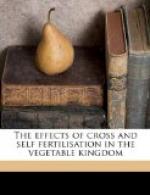The fertilisation of one of the higher plants depends, in the first place, on the mutual action of the pollen-grains and the stigmatic secretion or tissues, and afterwards on the mutual action of the contents of the pollen-grains and ovules. Both actions, judging from the increased fertility of the parent-plants and from the increased powers of growth in the offspring, are favoured by some degree of differentiation in the elements which interact and unite so as to form a new being. Here we have some analogy with chemical affinity or attraction, which comes into play only between atoms or molecules of a different nature. As Professor Miller remarks: “Generally speaking, the greater the difference in the properties of two bodies, the more intense is their tendency to mutual chemical action...But between bodies of a similar character the tendency to unite is feeble.” (12/15. ’Elements of Chemistry’ 4th edition 1867 part 1 page 11. Dr. Frankland informs me that similar views with respect to chemical affinity are generally accepted by chemists.) This latter proposition accords well with the feeble effects of a plant’s own pollen on the fertility of the mother-plant and on the growth of the offspring; and the former proposition accords well with the powerful influence in both ways of pollen from an individual which has been differentiated by exposure to changed conditions, or by so-called spontaneous variation. But the analogy fails when we turn to the negative or weak effects of pollen from one species on a distinct species; for although some substances which are extremely dissimilar, for instance, carbon and chlorine, have a very feeble affinity for each other, yet it cannot be said that the weakness of the affinity depends in such cases on the extent to which the substances differ. It is not known why a certain amount of differentiation is necessary or favourable for the chemical affinity or union of two substances, any more than for the fertilisation or union of two organisms.
Mr. Herbert Spencer has discussed this whole subject at great length, and after stating that all the forces throughout nature tend towards an equilibrium, remarks, “that the need of this union of sperm-cell and germ-ccell is the need for overthrowing this equilibrium and re-establishing active molecular change in the detached germ—a result which is probably effected by mixing the slightly-different physiological units of slightly-different individuals.” (12/16. ‘Principles of Biology’ volume 1 page 274 1864. In my ’Origin of Species’ published in 1859, I spoke of the good effects from slight changes in the condition of life and from cross-fertilisation, and of the evil effects from great changes in the conditions and from crossing widely distinct forms (i.e., species), as a series of facts “connected together by some common but unknown bond, which is essentially related to the principle of life.”) But we must not allow this highly generalised view, or the analogy of chemical affinity, to conceal from




